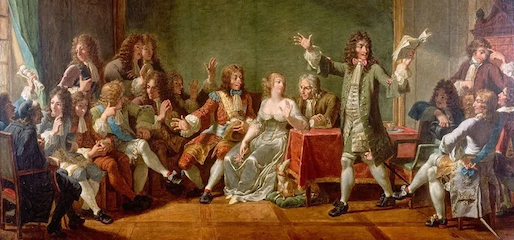
Cultural Salon. A gathering where intellectuals, artists, writers, and thinkers come together to engage in discussions, share creative works, and exchange ideas on various cultural, philosophical, political, and artistic topics. Originating in 17th-century France, salons played a significant role in shaping intellectual and artistic movements throughout history.
Origins and Historical Significance
The tradition of salons began in France during the 17th century, often hosted by aristocratic women in their private residences. These gatherings provided a space for philosophers, poets, and artists to converse and debate issues of literature, philosophy, and society. Notable salons in Paris, such as those led by Madame de Rambouillet and Madame Geoffrin, became intellectual hubs of the Enlightenment, influencing the spread of progressive ideas.
Function and Purpose
Cultural salons serve various purposes, including:
- Intellectual exchange – Providing a space for discussion on literature, politics, philosophy, and the arts.
- Artistic showcase – Enabling artists, musicians, and writers to present their work to an engaged audience.
- Social networking – Allowing like-minded individuals to connect and collaborate.
- Cultural development – Encouraging dialogue and critique that contribute to cultural and artistic evolution.
Modern Cultural Salons
While traditional salons declined in the early 20th century, contemporary versions have re-emerged in cities worldwide, often taking place in private homes, cafes, bookstores, and online forums. These modern salons continue to foster creative discourse, serving as platforms for artists, activists, and intellectuals to engage in meaningful conversations on current issues.
Notable Cultural Salons
- The Parisian Salons (17th-18th century) – Key sites of intellectual exchange during the Enlightenment.
- The Harlem Renaissance Salons (1920s-30s) – African American writers and artists, such as Langston Hughes and Zora Neale Hurston, gathered to discuss and celebrate Black culture.
- The Bloomsbury Group (early 20th century) – A collective of British intellectuals, including Virginia Woolf and John Maynard Keynes, who met for literary and artistic discussions.
Influence on Society
Cultural salons have historically influenced political and artistic revolutions by nurturing progressive thought and avant-garde movements. They continue to be essential spaces for critical discussions on social change, creativity, and intellectual freedom.